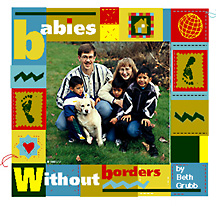

THE UNIVERSITY OF WASHINGTON ALUMNI MAGAZINE |

Part Four: Regional Clearinghouse ComingJohnson and Bledsoe, as well as the handful of other pediatricians, are on the cutting edge of transforming our understanding of international adoption. Bledsoe wants her clinic to be a regional clearinghouse of information for adoptive families. She's building a network of therapists and specialists who are knowledgeable about adoption, gathering books for a library and introducing adoptive families to each other. Bledsoe says she's planning educational events, such as asking adult Asian adoptees to talk to adoptive parents about their experiences. The UW also hosts an e-mail discussion group of about 45 physicians practicing international adoption medicine in the United States and Canada who discuss their findings and share information. The group is trying to work more closely with adoption agencies, Bledsoe says. "We know we create more work for adoption agencies. Our hope is also to identify factors that improve outcomes for orphanages, such as increasing the ratio of caregivers to children. We'd like to standardize how they take videos. It would be wonderful if we could get a trained person to go through a developmental assessment with a child on videotape." In addition to assessing a child's possible physical problems, parents must also consider issues of attachment and developmental delays. Although conditions vary greatly, living in an orphanage is not the best way to get a child started, experts agree. It's estimated that for every three months a child is placed in an orphanage, he or she will be delayed one month in development. Johnson agrees that institutionalization is an important factor in the development of adopted children. "A lot of what we knew, but never fully appreciated, is the effect of kids spending their formative years in institutions, as opposed to being with a family," he says. "Kids that have been institutionalized need rehabilitation time. Our knowledge of the effects of deprivation and institutionalization is important in making initial decisions on adoption as well as in parenting afterwards. And families are more comfortable making decisions when they have more information, so they're more likely to adopt." Although institutionalization is a concern, it's not insurmountable. "A lot of children do catch up, and pretty dramatically," Bledsoe says. Bledsoe points out that some orphanages are adequate-and they are certainly better than no care at all. "It's very clear there are some wonderful orphanages," she says. Although there have been no scientific studies yet, Bledsoe has encouraging anecdotal evidence. "In Cambodia, for example, the orphanage setting is physically poor, but every child is with one caregiver, so their attachment issues, their bonding issues and their developmental issues are much less a concern," she says. One of Bledsoe's patient-families appreciates the good start their children received in Chinese orphanages, or "social welfare homes," as they are called in China. Sally Yamasaki and her husband, Dan Benson, adopted two Chinese daughters, the first in 1994 and the second in 1998. "We have lots of friends in China and travel there often," Yamasaki says. "We're familiar with the culture and the country. That led us to want to adopt from China." Both daughters, Lina, 4, and Lara, 1, seem to have been well-cared for. Yamasaki and Benson were even able to visit the social welfare home that Lina came from. "It was a nice place," Yamasaki says. "There was one child to a crib and 12 to 15 children to a room with four caregivers." She said there was a playground outside and the home seemed well run. The couple didn't have the benefit of adoption medicine when Lina joined the family. Their first experience with this new medical field came with the most recent addition to the family, Lara. "It made a world of difference," Yamasaki says. What made Bledsoe different from the general pediatrician who took care of their first daughter, Lina, was that Bledsoe is herself an adoptive mother, Yamasaki says. Yamasaki says the information she and her husband received was comforting. Although they tried to read as much as possible, they could never keep up with all that Bledsoe knows. "She's familiar with the medical situation in other countries and knows how to interpret a typical medical report." When they traveled to China last year to pick up Lara, they were not allowed to visit the social welfare home where she had been living and weren't able to acquire much information. But Lara's health was good (she had only a case of dermatitis), she is developmentally advanced and shows no physical delays. "As time goes on, we just appreciate Julie more. She has a complete understanding of the concerns we have as adoptive parents," Yamasaki comments. Besides the physical health issues, Yamasaki says, emotional aspects are also nurtured in a clinic like this. Taking good physical care of a child is one thing; what's more difficult in parenting is providing for a child's emotional well-being. "You want to do the right thing," she says. Yamasaki is thinking ahead. "When the girls reach puberty and begin their search for identity, I can help them from the aspect of being an Asian American," she says. "But I'm going to be grateful that they'll also be able to talk with Julie." Yamasaki adds a personal thought. "People who haven't adopted always think the child is lucky. But we're all lucky," she says. "We feel fortunate to be a family." Beth Grubb is a Seattle free-lance magazine author. Her work appears in American Scientist, Washington Law and Politics and The Costco Connection. |
|
Resources for ParentsCenter for Adoption Medicine Joint Council on International Children's Services U.S. State Department Web Site Adoptive Families of America National Adoption Information Clearinghouse |
Home / Current Issue / Archives / Talk Back / Advertising / Columns FAQ / Alumni Website / Search